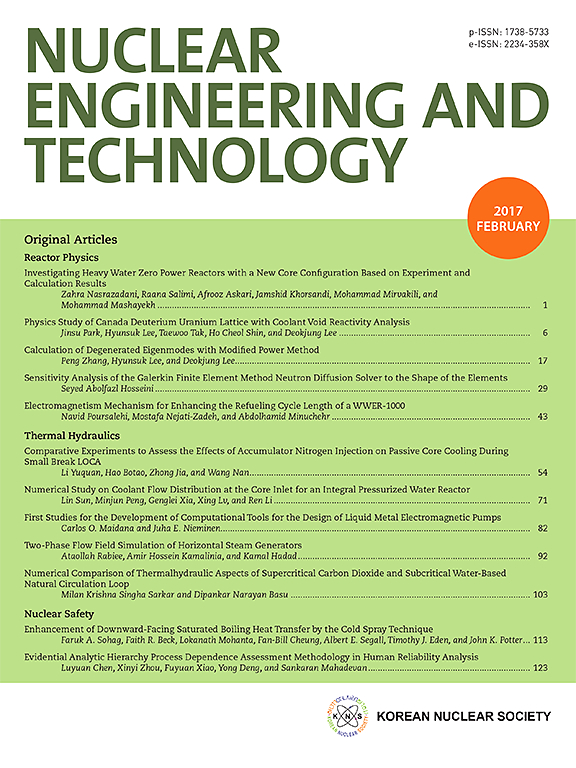Reconstructing North Korea’s plutonium production history with Bayesian inference-based reprocessing waste analysis
IF 2.6
3区 工程技术
Q1 NUCLEAR SCIENCE & TECHNOLOGY
引用次数: 0
Abstract
Although North Korea’s nuclear program has been the subject of extensive scrutiny, estimates of its fissile material stockpiles remain fraught with uncertainty. In potential future disarmament agreements, inspectors may need to use nuclear archaeology methods to verify or gain confidence in a North Korean fissile material declaration. This study explores the potential utility of a Bayesian inference-based analysis of the isotopic composition of reprocessing waste to reconstruct the operating history of the 5 MWe reactor and estimate its plutonium production history. We simulate several scenarios that reflect different assumptions and varying levels of prior knowledge about the reactor. The results show that correct prior assumptions can be confirmed and incorrect prior information (or a false declaration) can be detected. Model comparison techniques can distinguish between scenarios with different numbers of core discharges, a capability that could provide important insights into the early stages of operation of the 5 MWe reactor. Using these techniques, a weighted plutonium estimate can be calculated, even in cases where the number of core discharges is not known with certainty.
基于贝叶斯推理的再处理废料分析重建朝鲜钚生产历史
尽管朝鲜的核计划一直受到广泛关注,但对其裂变材料库存的估计仍充满不确定性。在未来可能达成的裁军协议中,核查人员可能需要使用核考古方法来核实或获得对朝鲜裂变材料申报的信心。本研究探讨了基于贝叶斯推理的后处理废物同位素组成分析的潜在效用,以重建5mwe反应堆的运行历史并估计其钚生产历史。我们模拟了几个场景,这些场景反映了不同的假设和不同程度的关于反应堆的先验知识。结果表明,正确的先验假设可以被确认,错误的先验信息(或虚假声明)可以被检测出来。模型比较技术可以区分不同堆芯放电次数的情况,这种能力可以为5mwe反应堆的早期运行阶段提供重要的见解。利用这些技术,可以计算出加权的钚估计值,即使在堆芯排放的数量不能确定的情况下也是如此。
本文章由计算机程序翻译,如有差异,请以英文原文为准。
求助全文
约1分钟内获得全文
求助全文
来源期刊

Nuclear Engineering and Technology
工程技术-核科学技术
CiteScore
4.80
自引率
7.40%
发文量
431
审稿时长
3.5 months
期刊介绍:
Nuclear Engineering and Technology (NET), an international journal of the Korean Nuclear Society (KNS), publishes peer-reviewed papers on original research, ideas and developments in all areas of the field of nuclear science and technology. NET bimonthly publishes original articles, reviews, and technical notes. The journal is listed in the Science Citation Index Expanded (SCIE) of Thomson Reuters.
NET covers all fields for peaceful utilization of nuclear energy and radiation as follows:
1) Reactor Physics
2) Thermal Hydraulics
3) Nuclear Safety
4) Nuclear I&C
5) Nuclear Physics, Fusion, and Laser Technology
6) Nuclear Fuel Cycle and Radioactive Waste Management
7) Nuclear Fuel and Reactor Materials
8) Radiation Application
9) Radiation Protection
10) Nuclear Structural Analysis and Plant Management & Maintenance
11) Nuclear Policy, Economics, and Human Resource Development
 求助内容:
求助内容: 应助结果提醒方式:
应助结果提醒方式:


